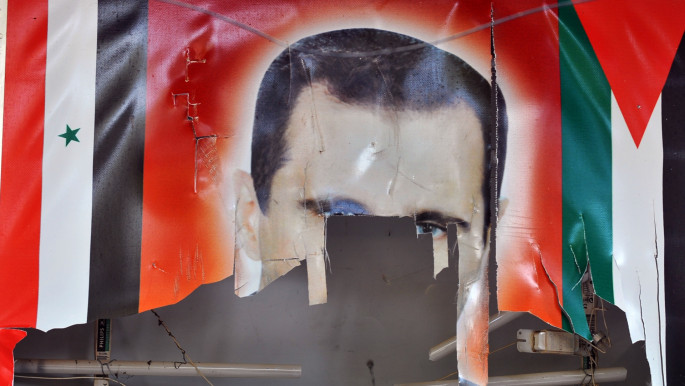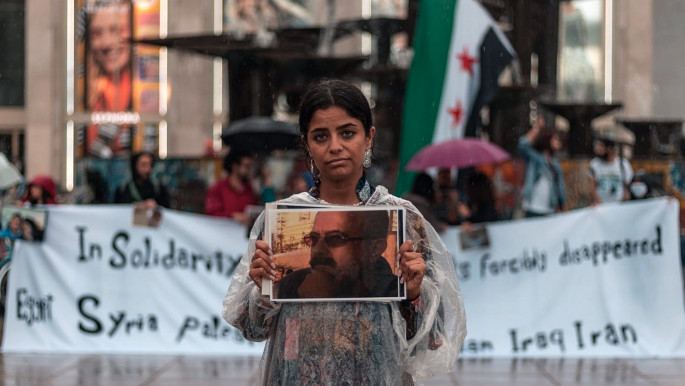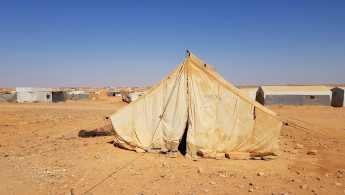'Only God can help us': Hunger and despair wreak misery in Syria's Rukban camp
Births are no easy affair in the squalid conditions of Rukban - a displacement camp of about 13,000 Syrian refugees stuck in the no-man's land between Jordan and Syria - with no doctors and only minimal medical equipment available, so it came as a relief when there were no apparent complications.
Relief quickly turned to panic however, as she noticed Maha, one of the two twins, was having trouble breathing. With the infant's colour quickly changing, Maha was rushed to the nearby clinic - but there was no working oxygen machine available there. The attending nurse tried performing mouth-to-mouth CPR, with little benefit. Maha died just three days later, on 12 February.
"All we needed was a canister of oxygen," Um Maha told The New Arab. "I lost Maha in front of my very eyes - and I could do nothing to save her. Now I can't even nurse Naha [Maha's twin], due to the shock."
Um Maha was not the first woman to face an emergency situation in Rukban while giving birth, nor will she likely be the last. Maternal healthcare is a particular challenge in the camp, with no doctors present and minimal equipment available.
In late November a "miracle" was performed, with a team of nurses successfully performing a C-section, saving both mother and child with no complications. The nurses lacked both the necessary experience and equipment for the operation but were forced to perform it themselves after being turned away by the US military forces which control the al-Tanf militarised zone where the camp is located.
 |
Humanitarian conditions have grown increasingly dire since 2018 after Jordan stopped allowing aid deliveries via its borders and Damascus cracked down on smuggling routes |  |
However, miracles are the exception to the rule, not the norm, and Maha had no such miracle on her side. Instead, she succumbed to the bleak reality of Rukban, the latest casualty of the ongoing siege of the camp. Humanitarian conditions have grown increasingly dire since 2018 after Jordan stopped allowing aid deliveries via its borders and Damascus cracked down on smuggling routes into the camp.
 |
|
| Read more: Charting the dramatic collapse of Syria's national currency |
The last aid delivery to the camp came almost a year-and-a-half ago, when Damascus last allowed the UN and Syrian Arab Red Crescent (SARC) into the camp in September 2019.
Access to medical care is a constant problem in the camp, as the residents are serviced only by a makeshift team of nurses operating with what little medical supplies can be smuggled into the camp.
Residents who need anything more than basic medical care must make the impossible choice of returning back to regime-held territory and facing the prospect of arrest and disappearance at the hands of security forces - or staying in the camp and hoping their conditions will improve.
Malnutrition is also a persistent challenge, with the last update by the UNICEF clinic which used to service the camp before being shut in March 2020 due to Covid-19 concerns showing that nearly 100 percent of the children under five who visited the clinic were malnourished.
Though there are no current statistics, it is almost certain that hunger has gotten worse in the camp, as rising food prices across Syria have produced a scarcity of food in the camp. In particular, the camp continues to suffer from a shortage of flour, resulting in a 50 percent price increase for a bundle of bread, from 1,000 Syrian Pounds to 1,500.
 |
Hunger has gotten worse in the camp amid rising food prices across Syria |  |
Private donors have sent money to try to help alleviate the bread crisis, but these initiatives only provide temporary relief. In one instance in early February, a donor sent $1,200, which provided two tons of flour to the camp - just enough bread to cover 2,000 families' needs for one day.
Smugglers typically bring in most of the camp's food, either through bribing their way into al-Tanf or by relying on the negligence of the Syrian Arab Army (SAA) officials to sneak in food. However, since the start of the new year, militias loyal to Maher al-Assad, Bashar al-Assad's brother and the head of the infamous 4th armoured division, have been deployed to the borders of al-Tanf. They reportedly have cracked down on smuggling, arresting one of the three smugglers the camp relies on in January.
The result is a growing feeling of desperation among residents as the already dire situation becomes even worse. Some accuse the opposition group, Maghawir al-Thawra (MaT), which controls the area alongside US forces, of stealing food from smuggled shipments. Others concentrate their efforts on taking care of the most needy, distributing what little food comes to widows and particularly impoverished families.
 |
|
| Read more: Syria Weekly: Conditions worsen in Syria's forgotten refugee camp |
Transition to Biden administration creates uncertainty
Though never a priority for US Syria policy, Rukban camp was at least on the radar of the Trump administration's Syria team. It is the official US stance that only Damascus bears responsibility for the welfare of the camp's residents. Still, activists were frequently in contact with US State Department officials to keep them abreast of the situation and the camp, and to lobby it for humanitarian relief measures.
However, the transition to the Biden administration and the still-unappointed US Special Envoy to Syria has thrown activists and residents of Rukban into limbo, leaving them uncertain how much attention the new administration will pay to the humanitarian situation in the camp.
Simone Jeger, a humanitarian activist who had previously been in frequent contact with senior officials in the State Department and Pentagon regarding the camp, has said that she has thus far been unable to communicate with new administration officials - despite promises from officials of the previous administration that they would ensure continuity.
 |
I don't want to ask any side for any help, we no longer have any hope that they will help us. We can only ask God for help now |  |
Previously, an initiative by the US-based medical NGO, Medglobal, to provide a doctor and fully-serviced clinic to the camp had been making progress, with the expectation that an initial health assessment of the camp would be carried out in early 2021.
Residents were aware of the initiative and had high hopes for it, having not had access to proper medical care since March of last year. However, the initiative has reportedly stalled since the new administration has taken office, with no date yet given for when it might resume again.
 |
|
| Read more: Gone but not forgotten: The fight for Syria's disappeared |
When asked about the status of the clinic, a US State Department spokesperson declined to comment, but reiterated to The New Arab that the US "calls on the Assad regime and Russia to permit safe and sustained access for humanitarian organizations to provide aid and other support."
A local organization in Rukban, the Tribal Council of Palmyra, has reportedly hired Mahmoud Diab, a Massachusetts-based-accountant, to lobby on behalf of al-Rukban in the US, with the aim to "work hard to improve the realities of the camp residents," as he told The New Arab.
However, it remains unclear if Diab's efforts have met with any success, as he declined to answer whether he has actually met with any officials in the State Department or the Biden administration.
As efforts stall in Washington, the residents of Rukban are losing faith that anyone is coming to help them. "I don't want to ask any side for any help, we no longer have any hope that they will help us," Um Maha said. "We can only ask God for help now."
*Names have been changed
William Christou is a MENA-based journalist covering the politics of the Levant and the Mediterranean, and a researcher with the Orient Policy Center. Previously he worked as a journalist with Syria Direct in Amman, Jordan. Follow him on Twitter: @will_christou



